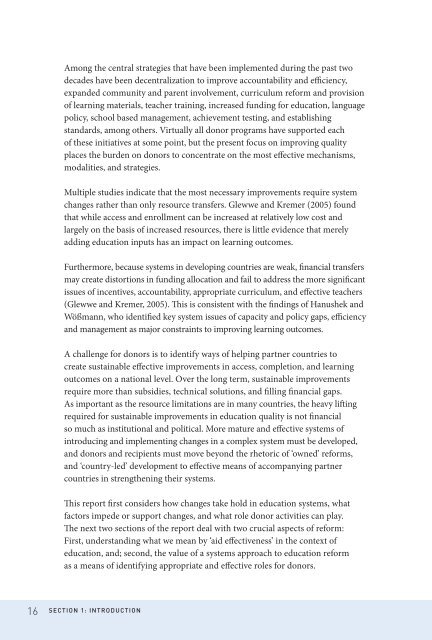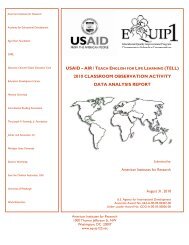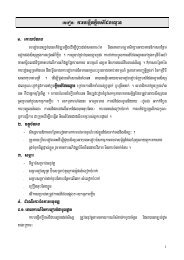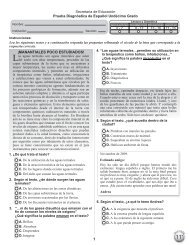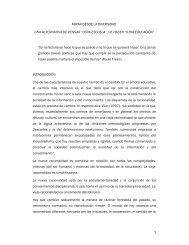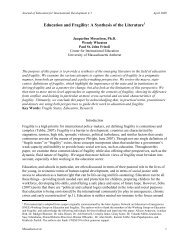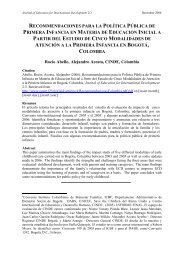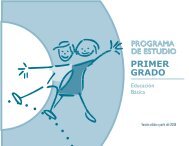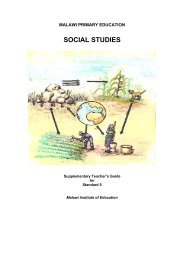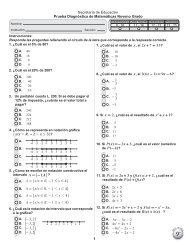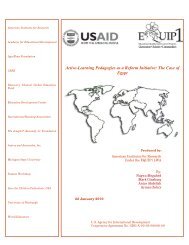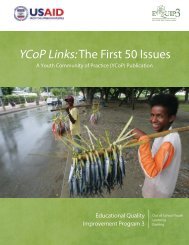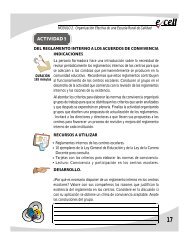The Power of Persistence: Education System ... - EQUIP123.net
The Power of Persistence: Education System ... - EQUIP123.net
The Power of Persistence: Education System ... - EQUIP123.net
Create successful ePaper yourself
Turn your PDF publications into a flip-book with our unique Google optimized e-Paper software.
Among the central strategies that have been implemented during the past two<br />
decades have been decentralization to improve accountability and efficiency,<br />
expanded community and parent involvement, curriculum reform and provision<br />
<strong>of</strong> learning materials, teacher training, increased funding for education, language<br />
policy, school based management, achievement testing, and establishing<br />
standards, among others. Virtually all donor programs have supported each<br />
<strong>of</strong> these initiatives at some point, but the present focus on improving quality<br />
places the burden on donors to concentrate on the most effective mechanisms,<br />
modalities, and strategies.<br />
Multiple studies indicate that the most necessary improvements require system<br />
changes rather than only resource transfers. Glewwe and Kremer (2005) found<br />
that while access and enrollment can be increased at relatively low cost and<br />
largely on the basis <strong>of</strong> increased resources, there is little evidence that merely<br />
adding education inputs has an impact on learning outcomes.<br />
Furthermore, because systems in developing countries are weak, financial transfers<br />
may create distortions in funding allocation and fail to address the more significant<br />
issues <strong>of</strong> incentives, accountability, appropriate curriculum, and effective teachers<br />
(Glewwe and Kremer, 2005). This is consistent with the findings <strong>of</strong> Hanushek and<br />
Wößmann, who identified key system issues <strong>of</strong> capacity and policy gaps, efficiency<br />
and management as major constraints to improving learning outcomes.<br />
A challenge for donors is to identify ways <strong>of</strong> helping partner countries to<br />
create sustainable effective improvements in access, completion, and learning<br />
outcomes on a national level. Over the long term, sustainable improvements<br />
require more than subsidies, technical solutions, and filling financial gaps.<br />
As important as the resource limitations are in many countries, the heavy lifting<br />
required for sustainable improvements in education quality is not financial<br />
so much as institutional and political. More mature and effective systems <strong>of</strong><br />
introducing and implementing changes in a complex system must be developed,<br />
and donors and recipients must move beyond the rhetoric <strong>of</strong> ‘owned’ reforms,<br />
and ‘country-led’ development to effective means <strong>of</strong> accompanying partner<br />
countries in strengthening their systems.<br />
This report first considers how changes take hold in education systems, what<br />
factors impede or support changes, and what role donor activities can play.<br />
<strong>The</strong> next two sections <strong>of</strong> the report deal with two crucial aspects <strong>of</strong> reform:<br />
First, understanding what we mean by ‘aid effectiveness’ in the context <strong>of</strong><br />
education, and; second, the value <strong>of</strong> a systems approach to education reform<br />
as a means <strong>of</strong> identifying appropriate and effective roles for donors.<br />
16<br />
SECTION 1: INTROdUCTION


